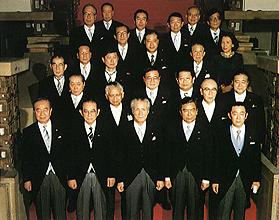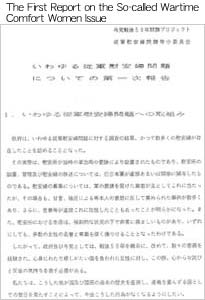 |
Establishment of the AW Fund, and the basic nature of its projects |
  |
| |
 In 1994, a coalition Government headed by Prime Minister Tomiichi Murayama was inaugurated in Japan. The coalition was formed by the Liberal Democratic Party of Japan, the Socialist Party, and the New Party Sakigake. In 1994, a coalition Government headed by Prime Minister Tomiichi Murayama was inaugurated in Japan. The coalition was formed by the Liberal Democratic Party of Japan, the Socialist Party, and the New Party Sakigake.
On 31 August 1994, the Prime Minister issued
a statement looking ahead to the 50th
anniversary of the end of the war, expressing once more his "profound and sincere remorse and apologies" with regard to the comfort women issue, and stating his desire to find "an appropriate way which enables a wide participation" of Japanese people in order to share such feelings of apology and remorse.
(Full Text ) )
Following up on the Prime Minister's statement, the three ruling parties launched a "Project To Deal with Issues Occasion of on the Fiftieth Years After the War," (Co-chairmen Kazuo Torashima-LDP, Kosuke Uehara-JSP, Satoshi Arai-Sakigake and established the Sub-committee To Address the Wartime Comfort Women Issue (Chairman Tsutomu Takebe).The sub-committee then began examining the issue.
The ruling parties and members of the government administration examined the stance taken by the Japanese Government until then. The Government's position has always been that the issues of reparation, material restitution and the right to claim compensation for events in the war had already been dealt with by the San Francisco Peace Treaty, bilateral treaties and other relevant accords, and that Japan had acted in accordance with those treaties and accords. The opinion was stated that, for this reason, Japan could not offer compensation to individuals. Some members of the ruling parties objected strongly and said Japan should pay compensation to individuals. The disagreement subsided due to the need for a quick resolution, and on 7 December 1994 the First Report on the So-called Wartime Comfort Women Issue was released (Full
text ). ).
 Respecting the report's recommendations, the Government decided to acknowledge moral responsibility for the comfort women issue, establish a Fund in cooperation with the people of Japan, promote projects expressing the atonement of the Japanese Government and people to the former comfort women, and promote other projects aimed at the resolution of contemporary problems faced by women. Respecting the report's recommendations, the Government decided to acknowledge moral responsibility for the comfort women issue, establish a Fund in cooperation with the people of Japan, promote projects expressing the atonement of the Japanese Government and people to the former comfort women, and promote other projects aimed at the resolution of contemporary problems faced by women.
As a first step, the government budget for fiscal 1995 set aside 480 million yen to subsidize the Fund's expenses. Then on 14 June 1995, Chief Cabinet Secretary Kozo Igarashi explained the proposed objectives of Josei no Tameno Ajia Heiwa Yuko Kikin (the name was provisional at the time, in English, Asian Peace and Friendship Foundation for Women), announced the names of proponents who would call for the Fund's establishment (Appendix 6), and defined the Government's role as follows: (i) the Fund will call for donations from a wide spectrum of Japanese society as a way to enact the Japanese people's atonement for the former comfort women; (ii) the Fund will support those conducting medical and welfare projects and other similar projects which are of service to former comfort women, through the use of government funding and other funds; (iii) when these projects are implemented, the Government will express the nation's feelings of sincere remorse and apology to the former comfort women; and (iv) the Government will collate historical documents relating to the comfort women, to serve as a lesson of history. The Chief Cabinet Secretary also clearly stated that the Fund would, through the use of government and other funds, support those who undertook projects aimed at resolving contemporary problems, such as violence against women.
|
 |
|
|
|

